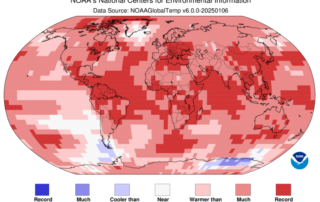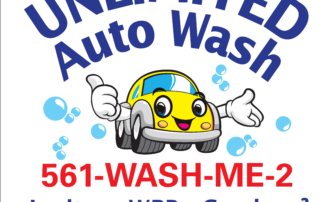Find and see the best corporate environmental sustainability news, posts and stories here, at Edenark Group’s “IN THE NEWS.” Let us know if you have environmental sustainability news you would like us to add.
It’s Official: 2024 was the warmest year on record!
Per NOAA, 2024 was the warmest year on record.
- North America had its warmest year on record.
- Europe had its warmest year on record.
- Africa had its warmest year on record.
- Oceana had its warmest year on record.
- Global ocean temperature was warmest on record.
- South America’s 2024 temperate tied its 2023 temperature as warmest on record.
- Asia had its second warmest year on record.
- Australia had it second warmest year on record.
The planet’s 10 warmest years on record…..were the last 10 years!
You can ignore.
You can say, “We need to do something,” but do nothing.
Or, if you wish to be part of the solution, watch this master class, then contact us.
Haymarket Media Renews its Environmental Sustainability Certification through 2025
Haymarket Media, part of the Haymarket global media organization has renewed its ISO 14001 sustainability certification through 2025 for its New York City offices through Edenark Group.
The ISO 14001 is the world’s premier environmental sustainability certification and Edenark Group’s certification program allows SMEs (small to mid-sized enterprises) to attain the world’s most popular environmental certification standard via a program designed specifically for them.
Edenark Group also helps clients pursue carbon neutrality and ESG compliance, using the ISO 14001 as a foundation for long-term compliance. The program helps organizations define how they interact internally, externally and with the environment, and focuses on its continual improvement in these areas.
“As a business we recognize our broader responsibility to society and this is displayed through Haymarket’s Impact initiative focused on the UN SDGs of Climate Action, Gender Equality, Quality Education and Partnerships. As a specialist media company, we actively engage our audiences in these topics through our content and in the past year since launching Impact, Haymarket brands globally received more than 2.5 million views to its content covering one or more of the UN SDGs. Renewing the ISO 14001 is a sign the US business of Haymarket is continuing its commitment to sustainability,” said John Crewe, Data Protection Officer, Haymarket Media, Inc.
“In parallel, Haymarket has completed an extensive, third-party assessment to measure its Scope 1, 2 and 3 emissions and is engaging suppliers to raise the commitment to sustainability practices and emissions reduction. Not only do we want to do the right thing for the environment in our own offices, we also want to lead by example for other organizations everywhere.”
The certification incorporates energy/waste/water, employee health and performance enhancement, community involvement, procurement and suppliers, compliance and regulations, emergency/security, and stakeholder engagement. Benefits include creating a culture of continual improvement, stakeholder engagement, lower costs, higher revenues and profits, improved employee performance, and doing the right thing for the environment and current and future generations.
“When an organization pursues, attains, then renews, the Edenark Group ISO 14001 sustainability certification, they are setting a higher bar for their organization and sending a signal to all those around them,” said David Goodman, CEO of Edenark Group. “They are agreeing to adhere to the world’s gold standard for sustainability certification; are choosing to be a leader and part of the solution; and are joining an elite community of over 300,000 organizations, in over 150 countries, that have committed to continually improving in every way.”
The Supply Chain Opportunity for You
This article, titled “The Small Business Blind Spot in Supply Chains” talks about a topic we have been posting on for a while –
- Over 70% of a company’s greenhouse gas emissions (GHG) are via its supply chain
- Climate change is causing companies to set goals to reduce their GHG
- 90% of these companies then force their suppliers to take action on sustainability
- The majority of their SME suppliers are not prepared for this
The article does not suggest the client company give its SMEs a pass. It says the client company should start the process with its supply chain NOW, so SMEs can decide if they wish to remain a vendor, and if so, how they are going to achieve their sustainability targets.
If you are a SME supply chain vendor and want to proactively get ahead of this in order to take market share, watch this master class, then contact us.
Sustainability starts and ends with People
Unlimited Auto Wash of 12194 FL A1A Alt, Palm Beach Gardens, FL has renewed its Sustainability Certification through 2025
Unlimited Auto Wash of 12194 FL A1A Alt, Palm Beach Gardens, FL, is part of the six-location Unlimited Auto Wash Club that serves South Florida. Unlimited Auto Wash is a 100% Full Service Hand Car Wash with over 175 employees. It cares deeply about the environment and the community it serves and has renewed its Edenark Group ISO 14001 environmental sustainability certification through 2025.
The Edenark Group ISO 14001 is the world’s premier environmental sustainability certification program and allows SMEs (small to mid-sized enterprises) the ability to attain the world’s most popular environmental certification standard via a program designed and priced specifically for them. This allows an organization to validate, via 3rd party audit against the world’s top standard, its environmental / sustainability / green / eco-friendly actions.
The program, which allows companies to progressively improve at a pace that works for their needs, helps the organization define how it interacts internally, externally, and with the environment. It incorporates energy/waste/water, employee health and performance enhancement, community involvement, procurement and suppliers, compliance and regulations, emergency/security, and stakeholder engagement. Benefits include creating a culture of continual improvement, stakeholder engagement, lower costs, higher revenues and profits, improved employee performance, and…… doing the right thing for the environment for current and future generations.
“We are the first, and only, environmentally certified sustainable car wash operation in Palm Beach County, Florida. We do things the right way, raised the bar for our industry in 2024, and plan to keep the bar high in 2025,” says Kevin Dalton, CEO of Unlimited Auto Wash. “The Edenark Group ISO 14001 sustainability certification program provides us the opportunity to show all our stakeholders – our customers, our employees, our vendors and our community – the kind of organization we are.”
“Sustainability is not a one-and-done event. It is a process of continual improvement. Any organization that claims to be sustainable and does not have an annual certification via a globally recognized program with 3rd party verification is greenwashing; they are not willing to have their actions validated. When an organization attains and renews the Edenark Group ISO 14001 sustainability certification, they are not just doing it to see their costs go down and revenues and profits go up; they are setting a higher bar for their organization and sending a signal to all those around them,” says David Goodman, CEO of Edenark Group. “They agree to adhere to the world’s Gold standard for sustainability certification; are choosing to be a leader and part of the solution, not the problem; and are joining an elite fraternity of over 300,000 organizations, in over 150 countries, that have committed to continually improve in every way.”
Unlimited Auto Wash can be reached at +1 561-WASH-ME-2
Edenark Group can be reached at +1 561.512.2257
As we start 2025, what is the #1 thing you, as an individual, can do, to help the environment?
Most people recognize the environmental problems we are facing. This is not a complete list, but it is sobering, nonetheless:
- CO2 emissions have increased 50% by 1990, accelerating global warming and impacting all life on Earth
- 90% of us breathe polluted air, causing 7 million deaths a year
- Almost all of us drink contaminated water, causing 5 million deaths a year
- Our oceans are overfished, increasing in temperature and full of plastics and waste
- Nearly 25% of animal species are at risk of extinction
- Forests are being destroyed
- We are not producing enough food
Most people say, “I would love to help, but what can I do?”
Let’s start the answer with this article about a rancher destroying the Amazon rain forest to raise cows for your hamburgers. He takes the risk, and admits he is doing the damage, because our demand for meat is so great.
You probably know Processed Meat (any meat treated to improve favor or last longer, like deli meat or any meat in a package), is a Group 1 Carcinogen; in the same cancer-causing camp as asbestos, arsenic, mustard gas, neutron radiation, plutonium, cigarette smoking…
You probably know Red Meat is a Group 2 Carcinogen; in the same cancer-causing camp as formaldehyde, nitrate, silicon carbide…
You probably know that white meat and fish are expected to be added to the Group 2 list due to the impact of commercial meat factories…
You probably know that +90% of the meat you purchase at the store has fecal matter in it…
You probably know that animals are the middleman to you getting the protein you need…
You probably know the human body, from our teeth to our digestive tract, is built for plant digestion, not meat digestion…
You probably know meat harms your gut and biome and plants rebuilds it…
You probably know meat will increase your calories, cholesterol, risk of heart disease, risk of mental disease, risk of gastro-intestinal disease…
You probably know that a plant-based diet will be less expensive and healthier.
But did you know, the biggest opportunity we have to address our environmental problems and global warming is….reduced meat production?
- 18% of global greenhouse gas emissions and climate impact is from the production of meat. This is equal to the emissions from all the cars, trucks, planes and boats.
- 75% of the world’s agricultural land is used for the production of meat (including the Amazon land destroyed in the above article)
- 20% of global fresh water is used in the production of meat
So, the next time you get ready to take a bite of your expensive hamburger, remember:
- It likely has fecal matter in it
- Your body was not built to digest it
- The protein is from plants
- You will get fatter and die younger from it
- It is the biggest opportunity we have to correct our environmental / climate problem
- And, you have control over what you eat
Unlimited Auto Wash of Wellington, FL has renewed its Sustainability Certification through 2025
Unlimited Auto Wash of Wellington, FL, is part of the six-location Unlimited Auto Wash Club that serves South Florida. Unlimited Auto Wash is a 100% Full Service Hand Car Wash with over 175 employees. It cares deeply about the environment and the community it serves and has renewed its Edenark Group ISO 14001 environmental sustainability certification through 2025.
The Edenark Group ISO 14001 is the world’s premier environmental sustainability certification program and allows SMEs (small to mid-sized enterprises) the ability to attain the world’s most popular environmental certification standard via a program designed and priced specifically for them. This allows an organization to validate, via 3rd party audit against the world’s top standard, its environmental / sustainability / green / eco-friendly actions.
The program, which allows companies to progressively improve at a pace that works for their needs, helps the organization define how it interacts internally, externally, and with the environment. It incorporates energy/waste/water, employee health and performance enhancement, community involvement, procurement and suppliers, compliance and regulations, emergency/security, and stakeholder engagement. Benefits include creating a culture of continual improvement, stakeholder engagement, lower costs, higher revenues and profits, improved employee performance, and…… doing the right thing for the environment for current and future generations.
“We are the first, and only, environmentally certified sustainable car wash operation in Palm Beach County, Florida. We do things the right way, raised the bar for our industry in 2024, and plan to keep the bar high in 2025,” says Kevin Dalton, CEO of Unlimited Auto Wash. “The Edenark Group ISO 14001 sustainability certification program provides us the opportunity to show all our stakeholders – our customers, our employees, our vendors and our community – the kind of organization we are.”
“Sustainability is not a one-and-done event. It is a process of continual improvement. Any organization that claims to be sustainable and does not have an annual certification via a globally recognized program with 3rd party verification is greenwashing; they are not willing to have their actions validated. When an organization attains and renews the Edenark Group ISO 14001 sustainability certification, they are not just doing it to see their costs go down and revenues and profits go up; they are setting a higher bar for their organization and sending a signal to all those around them,” says David Goodman, CEO of Edenark Group. “They agree to adhere to the world’s Gold standard for sustainability certification; are choosing to be a leader and part of the solution, not the problem; and are joining an elite fraternity of over 300,000 organizations, in over 150 countries, that have committed to continually improve in every way.”
Unlimited Auto Wash can be reached at +1 561-WASH-ME-2
Edenark Group can be reached at +1 561.512.2257
As we start 2025, why not become a referral partner?
Due to studies, the #1 issue on the minds of people around the world is the environment (ie, we are using our resources faster than Mother Earth can replenish and we are accelerating our carbon-emissions-driven global warming). The world we are passing to our children will be far hotter and angrier than the world we were given. This is a bigger concern to the people of the planet than war, economy, politics, et cetera.
Turning this sentiment to the market place, consumers are more interested in a company’s ability to prove its sustainability commitment than they are in its brand names. 7 out of 10 of them will change brands if they find a certified sustainable company that offers a similar product. They will even spend more for a certified sustainable product.
Driven by the above demand, certified sustainable companies are growing up to 20x faster than their non-certified peers – the market is rewarding companies that are able to prove they are sustainable (via certification/validation).
The Edenark Group ISO 14001 environmental sustainability certification program is the premier program of its kind in the world – You get to help the planet and differentiate and grow faster than your peers.
We have a 100% client renewal rate – every client we have ever certified has renewed, every year.
We get most of our new clients from referrals from existing clients.
However, we also get a good number of clients from referral partners who like what we do and introduce us to organizations they feel would benefit from our services.
This defines what we believe a sustainability program should contain.
This master class explains why a company would want to do this.
We are looking for organizations that 1) care about the environment; 2) want to be part of the solution; and 3) want to be an example that other organizations can follow.
If you agree with our mission and our definition of what a sustainability program should be; and if you know some organizations that meet the above requirements; you might want to consider becoming a referral partner.
Send us a note and we can discuss.
CO2 rising 10 times faster than any time in last 50,000 years
Per this article, CO2 emissions, largely driven by human activity, is rising 10 times faster than at any time in recorded history.
When a far less rapid growth happened 50,000 years ago it triggered an environmental chain reaction impacting oceans and climate.
For those saying “Fake News” or “This is just a cycle” or “It is not my job”, I wish you were right.
Buckle up!
Gym for the Brain Renews its Sustainability and Carbon Neutrality Certifications through 2025
Gym for the Brain (https://www.gymforthebrain.com/), a Florida-based proactive body biohacking and contrast oxygen EWOT (exercise with oxygen therapy) facility, which also operates through the online store A Better World Starts With Me (https://abetterworldstartswithme.com/ ) has renewed its sustainability certification and its carbon neutrality certification through 2025.
The Edenark Group ISO 14001 is the world’s premier environmental sustainability certification program and allows SMEs (small to mid-sized enterprises) a program designed and priced specifically for them.
The Edenark Group ISO 14065 / 14001 carbon neutrality certification is for organizations that have become certified sustainable and wish to become carbon neutral: the natural next step in their environmental stewardship journey. This program allows a company, using its sustainability plan as a foundation, the ability to quantify, manage, reduce, and neutralize its carbon emissions.
The programs, which allow companies to progressively improve at a pace that works for their needs, help the organization define how it interacts internally, externally, and with the environment. They incorporate energy/waste/water, employee health and performance enhancement, community involvement, procurement and suppliers, compliance and regulations, emergency/security, and stakeholder engagement; and quantify Scope 1 and 2 emissions. Benefits include creating a culture of continual improvement, stakeholder engagement, lower costs, higher revenues and profits, improved employee performance, and…… doing the right thing for the environment and current and future generations.
“Gym for the Brain is doing wonderful work by helping people remove toxins, reduce inflammation, increase body and brain strength, and improve health. Sending those people back out into a toxic world is frustrating. The Edenark Group ISO 14001 sustainability certification program and the Edenark Group ISO 14065 / 14001 carbon neutrality program combine to allow Gym for the Brain to not only help people while at the Gym, but also when they leave the Gym, by proactively participating in improving the environment via internal and external environmental sustainability and carbon reduction actions,” says David Goodman, CEO of Edenark Group. “They are agreeing to adhere to the world’s Gold standard for sustainability and carbon neutrality certification; and are joining an elite fraternity of over 300,000 organizations, in over 150 countries, that have committed to continually improving in every way.”
Gym for the Brain (https://www.gymforthebrain.com/ ) can be reached at +1.561.408.6890
A Better World Starts With Me ( https://abetterworldstartswithme.com/ ) can be reached at https://abetterworldstartswithme.com/pages/contact
Edenark Group (https://edenark.com ) can be reached at +1 561.512.2257









